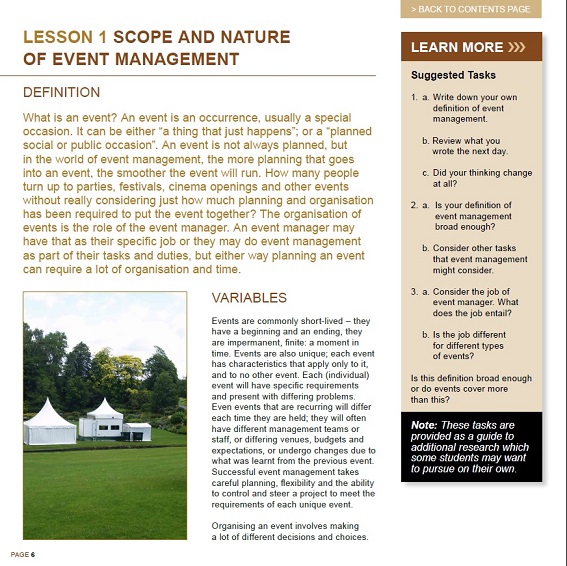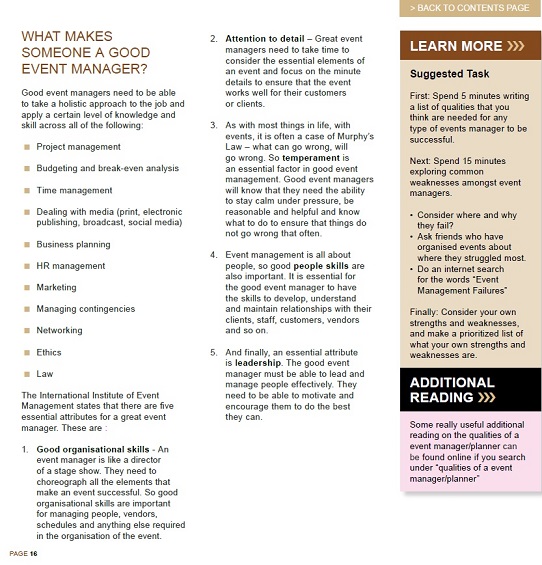Sneak Peek
Learn To Manage Events
Some people make a career out of managing events; from wedding and party planners to concert promoters and those who run shows and exhibitions. This short course may be a first step toward working in something like this; or it may just be a way of adding to your skills to enhance a job you already have. For others, this can be a way of learning how to organise that special celebration yourself, rather than needing to go to the expense of employing a professional to help you.
Using a self paced, interactive study guide; you can take as much or little time as you wish to complete this course.
As you progress through each lesson; you will be provided with a range of ways you can expand your learning. By choosing what tasks you do and don't undertake; you can expand in areas that interest you most, and skip areas of less interest.
You won't miss anything important that you need to know about managing events though; so long as you read the notes that are presented alongside these "learn more" suggestions.
At the end of each lesson, you will be given a short interactive test to undertake, which will provide an indication of how your learning is progressing. Upon completing the very last lesson, you will be offered a more thorough automated test or examination. This final assessment can be undertaken at any time of day or night; and any day of the week; and if you achieve an overall pass; you will be able to obtain a "certificate of completion".
The Lessons
LESSON 1 SCOPE AND NATURE OF EVENT MANAGEMENT
Definition
Variables
Types of events
The impact of events
Timelines
What is an event worth?
What makes someone a good event manager?
Review the lesson with Interactive tests
LESSON 2 DEVELOPING A CONCEPT AND PLANNING
The need
Expectation determination
Developing concepts
The stakeholders
Planning processes
Review the lesson with Interactive tests
LESSON 3 ORGANISING THE RESOURCES REQUIRED
Location
Organising physical resources and services
Financial resources
Managing financial resources
Marketing resources
Outsourcing resource requirements
Review the lesson with Interactive tests
LESSON 4 CATERING: FOOD AND DRINK
Determining food and beverage needs
Review the lesson with Interactive tests
LESSON 5 PROMOTING AN EVENT
Marketing an event
Case study - marketing strategy: use of public parks and gardens for events
Target marketing
How to determine the target
The marketing mix
How to promote a private event
How to promote a public event
Self-assessment test panel
LESSON 6 MANAGING THE CLIENTELE
Accessibility
Queuing theory
Negative situations
Conflict handling techniques
Dealing with your anger and emotions
Self-assessment test panel
LESSON 7 RISK MANAGEMENT, LEGALITIES AND CONTINGENCY PLANNING
Planning for the unexpected
Risk analysis
Tools for identifying risks
Negating risk
Contingency planning
Legal issues
Insurance
Security at events
Self-assessment test panel
LESSON 8 DELIVERING THE EVENT
Some things to consider before setting-up day
After the event
Review the lesson with Interactive tests
LESSON 9 ORGANISING CELEBRATIONS AND PARTIES
A children’s party
A wedding
A reunion
A street party
Review the lesson with Interactive tests
LESSON 10 ORGANISING EXHIBITIONS
Guidelines for planning a show or exhibition
Review the lesson with Interactive tests
LESSON 11 ORGANISING CONFERENCES AND SEMINARS
Organising a conference
Review the lesson with Interactive tests
LESSON 12 WORKING IN THE EVENT INDUSTRY
Where to from here?
Education
Job profiles
Wedding planner
Concert promoter
Party planner
Conference organiser
Salary and qualifications
Final assessment
Start with a Good Venue
When staging any event, it is important to consider the choice of venue. Venues chosen will either be purpose built, i.e. designed and built for a particular venue. An example of this is an entertainment centre that is designed for large concerts or performances. Venues can also be chosen, not because they are purpose built, but because they provide adequate space for the specified event. This includes halls that can be adapted to meet the needs of organisers planning an event. In the past, venues have been chosen because of their atmosphere and natural beauty. For example, staging an open-air concert may highlight the natural environmental setting of an open area better that staging the event in an enclosed venue.
When selecting a venue for an event, consideration should be given to the following:
- availability of the venue
- transport to and from the chosen venue
- access for the audience, equipment, performers, VIP’s, staff, people with disabilities, vehicles and traffic flow
- availability of power and where the power points etc are located
- water – indoor and outdoor – location of taps is also important for outdoor events
- toilets and other amenities – do they meet the expected size of attendance?
- communication facilities, e.g. telephone
- signed exits in case of fire or other emergencies
- size and type of venue – does it suit your needs? Is it to be a mix of outdoor and indoor areas? Will your event be staged at more than one venue?
- catering equipment and kitchens are suitable.
Support along the Way from Experts
You have access to expert tutors through our student help desk all the time you are studying this course. Our school maintains help desks in both of our offices -in Australia and the UK; and has staff on duty five days a week manning phones, online chat and emails. Any questions that you have about what you are studying will be dealt with promptly (usually the same working day, often immediately).
- If there is something you read or research that you don't understand, ask for help.
- If you want to learn more about something you encounter through these studies, have a conversation with one of our faculty tutors
- If you need direction to find more information, ask
- If you need advice on moving forward with your work, career or studies after the course ask. (Free career and business advice is part of the service provided to all of our graduates).
Sample Pages from the Course


How does this course work?
You can enrol at any time.
Once you have paid for the course, you will be able to start straight away.
Study when and where you like. Work through at your own pace.
You can download your study-guide to your smart phone, tablet or laptop to read offline.
There are automated self-assessment tests you can complete at the end of each lesson. You can attempt these as many times as you wish and each time, upon completion, you can see your results. You will need internet access to complete the self assessment tests.
At the end of the course, you are presented with a large assessment which can be attempted online, anywhere, anytime. If you achieve a 60% pass in the exam; you immediately receive a downloadable certificate of completion with your name on it. If you do not achieve a 60% pass rate, you can contact us to re-sit your exam. ( email- admin@acs.edu.au )
Contact us at anytime if you have any issues with the course. admin@acs.edu.au